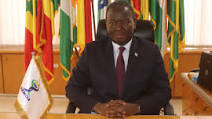Convergence, integration and governance. These are the three areas of intervention broken down into 23 flagship actions of the West African Economic and Monetary Union (UEMOA) within its framework of Priority Actions “CAP25” for the period 2021-2025.
Africa’s most integrated area is developing a roadmap focused on accelerating integration, economic convergence and deepening the common market.
The college of commissioners, which took office last May under the chairmanship of Senegalese Abdoulaye Diop, has thus equipped itself with an instrument for planning and steering its flagship interventions during his term of office.
The exercise was all the more urgent given that the various documents which served as a framework for actions by the Commission, in particular “UEMOA in 2020”, the “Strategic Plan of the Commission 2011-2020” and the “Roadmap 2017-2021 ”have reached their horizon.
Concretely, the three areas of intervention, in accordance with the amended Treaty of the Union, are as follows:
• Acceleration of economic convergence and deepening of the common market;
• consolidation of structuring sectoral actions for a viable economic space;
• strengthening governance and organizational performance.
These strategic objectives are translated into three (03) axes of intervention, structured around 23 flagship actions, with high added value, structuring, likely to produce concrete results by 2025 and intended to make the Commission of UEMOA a modern institution aligned with international standards.
Convergence
In its first axis, the commission intends to strengthen the convergence of economies and consolidate the common market so as to encourage the real emergence of a competitive regional private sector for the benefit of the populations. This axis is broken down into 7 flagship actions. These include, among others, the establishment of the Free Practice regime
Integration
The second axis, which relates to the consolidation of structuring sectoral actions for a viable economic space, has retained 10 flagship actions. These include, among other things, the establishment of industrial competitiveness clusters; the development of energy poles; the development of the offer of digital services; the development of regional training and research centers in the UEMOA area; the establishment of an intervention mechanism for the prevention and management of epidemics within the WAEMU area; the operationalization of the mechanism for promoting cultural and creative businesses and industries; the promotion of sustainable agriculture; strengthening food and nutritional security; strengthening the resilience of populations in the face of hazards and climate change; and Promotion of cross-border cooperation.
Governance
The other WAEMU priority concerns strengthening governance and organizational performance. 6 flagship actions are selected at this level. This involves the implementation of strategic steering tools; continued implementation of the program budget; valuing and strengthening internal skills; strengthening mechanisms for the mobilization and governance of financial resources; reinforcement
capacities for mobilizing partnerships and absorbing external resources; and the establishment of mechanisms for steering and monitoring policies, programs and reforms.
The implementation of Cap 2025 will be ensured through a monitoring and evaluation system, coordinated by the College of Commissioners. This system will make it possible to make the necessary adjustments at the appropriate time, particularly in terms of intensifying human, financial and political efforts in view of the difficulties encountered so that the results planned for 2025 are up to the ambitions.
Ultimately, CAP 2025 should lead the Commission to move to a “management of its strategic priorities oriented towards the achievement of long-term results” linked to economic convergence and the deepening of the common market, to the consolidation of actions. structuring sectors for a viable economic space as well as improving governance and organizational performance.
This roadmap is an institutional steering instrument and commitment to specific achievements during the mandate of the College of Commissioners for the period 2021-2025.
within UEMOA; strengthening the operational capacities of structures implementing competition rules; the establishment of a stabilization fund within the Union; the production and promotion of regional statistics (IHPC, MCS and MEGC, BDSM renovation); Development of efficient transport and transit infrastructure; promotion of multimodal transport; and support for secure border management in the WAEMU area.



